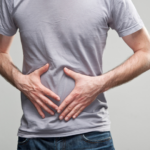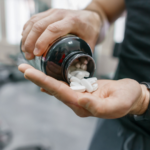Medically reviewed by
What are LUTS?
Lower urinary tract symptoms (LUTS) are problems you notice with passing urine.
LUTS may be present in around 50% of men aged over 18, but the prevalence depends on the definition of LUTS .
Studies from Australia and overseas show that the prevalence of LUTS increases with age, especially after age 60.
Lower urinary tract symptoms
LUTS are grouped into two categories: Storage symptoms and Voiding symptoms
Storage symptoms include:
Voiding symptoms include:
Storage symptoms are twice as common as voiding symptoms in men, with nocturia (almost 1 in 2 men) and urgency (1 in 10 men) the most common. Terminal dribble is the most common voiding symptom in men (1 in 7).

Over 2.4 million Australian men and boys live with incontinence.
Causes of LUTS
Both categories of LUTS are associated with obstructive sleep apnoea.
Benign prostatic hyperplasia (BPH) is a common cause of LUTS in men, which becomes more common with age.
Other causes of LUTS in men include urinary tract infections, bladder muscle over-activity, and blockages in the bladder or along the urethra.
Weak pelvic floor muscles can also cause LUTS. Cancer of the lining of the inside of the bladder, kidneys or ureters (the tubes that carry urine from the kidneys to the bladder).
Subscribe to our newsletter

Diagnosis of LUTS
Treatment of LUTS
Treatment for LUTS will depend on your specific symptoms and other health factors.
Mild LUTS may be managed by changes in your behaviour, such as watching what you drink and when. Pelvic floor exercises or ‘bladder training’ may also help.
Some medications can cause LUTS, so your doctor may review and/or change these.
There are several types of medications that can be used to treat LUTS, some of which target the prostate if BPH is the cause.
LUTS due to BPH that does not respond to medical treatment may need surgery.
Medicines to treat urge incontinence cure about half of the people who use them, whereas surgery helps more than 4 out of 5 people. Pelvic floor muscle training cures between 1 in 4 and 4 in 5 people.
Health effects of LUTS
LUTS can be a significant source of bother for some people. LUTS might make you reluctant to leave your house or socialise because of the inconvenience of needing to go to the toilet often or in a hurry.
LUTS can make you anxious and depressed and impact your personal relationships.
Loneliness and social isolation caused by LUTS may have other effects on your health.
Sexual dysfunction, such as problems with erections or ejaculation, can accompany LUTS for some men.
Urinary retention can be painful and can lead to urinary tract infections and damage to the bladder or kidneys.
LUTS can be a sign of a serious underlying condition, so it’s really important to see your doctor if you have any urinary symptoms.
What to do about LUTS
If you notice any lower urinary tract symptoms, you should see your doctor to discuss your symptoms, their impact on you and your treatment options.
Your LUTS may progress and get worse without treatment, so seeing your doctor early is best.
If you have symptoms of acute urinary retention (i.e. pain, bladder distension or an inability to pass urine), you should seek immediate medical help. It may be necessary for a doctor to insert a catheter to drain your bladder.













